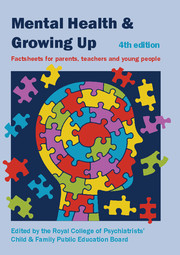Book contents
- Frontmatter
- Contents
- Contributors
- Factsheets for young people
- 1 Bipolar disorder
- 2 Cannabis and mental health
- 3 Cognitive–behavioural therapy (CBT)
- 4 Coping with stress
- 5 Depression
- 6 Drugs and alcohol
- 7 Exercise and mental health
- 8 Mental illness in a parent
- 9 Obsessive–compulsive disorder (OCD)
- 10 Psychosis
- 11 Schizophrenia
- 12 When bad things happen – overcoming adversity and developing resilience
- 13 Worries about weight and eating problems
- 14 Worries and anxieties
- 15 Who's who in child and adolescent mental health services (CAMHS)
- Factsheets for parents, carers and anyone who works with young people
13 - Worries about weight and eating problems
from Factsheets for young people
Published online by Cambridge University Press: 02 January 2018
- Frontmatter
- Contents
- Contributors
- Factsheets for young people
- 1 Bipolar disorder
- 2 Cannabis and mental health
- 3 Cognitive–behavioural therapy (CBT)
- 4 Coping with stress
- 5 Depression
- 6 Drugs and alcohol
- 7 Exercise and mental health
- 8 Mental illness in a parent
- 9 Obsessive–compulsive disorder (OCD)
- 10 Psychosis
- 11 Schizophrenia
- 12 When bad things happen – overcoming adversity and developing resilience
- 13 Worries about weight and eating problems
- 14 Worries and anxieties
- 15 Who's who in child and adolescent mental health services (CAMHS)
- Factsheets for parents, carers and anyone who works with young people
Summary
How do I stay healthy and have a normal weight?
Our bodies need a healthy diet which should include all the things you need to develop normally – proteins, carbohydrates, fats, minerals and vitamins. Cutting out things you might see as fattening, such as carbohydrates or fats, can stop your body from developing normally.
There are some simple rules that can help you to keep a healthy weight. They sound quite easy, but might be more difficult to put into practice. You can ask your family and friends to help you to stick to these rules. It might even help them to be a bit healthier!
• Eat regular meals – breakfast, lunch and dinner. Include carbohydrate foods such as bread, potatoes, rice or pasta with every meal.
• Try to eat at the same times each day. Long gaps between meals
can make you so hungry that you eventually eat far more than you need to.
• Get enough sleep.
• Avoid sugary or high-fat foods and junk foods. If you have a lunch of crisps, chocolate and a soft drink, it doesn't feel as if you're eating much, but it will pile on the pounds. A sandwich, fruit and milk or juice will fill you up, but you are much less likely to put on weight – and it's better for your skin.
• Take regular exercise. Cycling, walking or swimming are all good wayAs of staying fit without going over the top.
• Try not to pay too much attention to other people who skip meals or talk about their weight.
If you follow these suggestions, you will find it easier to control your weight, and you won't find yourself wanting sweet foods all the time.
What about ‘miracle cures’ for losing weight – do they work?
There seems to be a new one of these almost every week. Sadly, they often do more harm than good.
• Crash diets don't help you to keep your weight down. In fact, they might make you put on weight after a while. At worst, they can be dangerous to your health.
• Exercise helps, but it's got to be regular and increased gradually. Too much exercise, or too much too soon, can damage your body.
- Type
- Chapter
- Information
- Mental Health and Growing UpFactsheets for Parents, Teachers and Young People, pp. 38 - 41Publisher: Royal College of PsychiatristsPrint publication year: 2013



